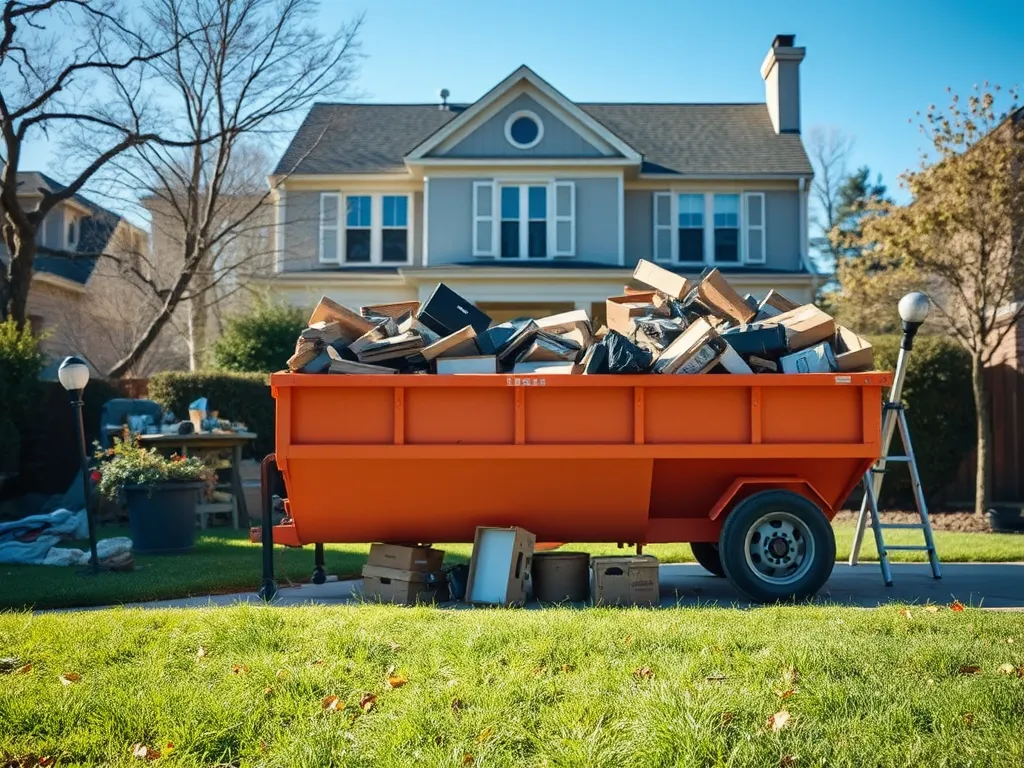Ultimate Guide to Dumpster Rental for Estate Cleanouts

A Comprehensive Guide to Dumpster Rental for Estate Cleanouts
When it comes to estate cleanouts, whether due to downsizing, moving, or dealing with a loved one's belongings, the process can be overwhelming. Dumpster rental estate cleanout services simplify this task by providing a practical and efficient way to dispose of large volumes of waste and unwanted items. With the right dumpster rental, you can ensure that your cleanout is carried out smoothly and responsibly.
The benefits of utilizing dumpster rental estate cleanout services are numerous. These services save time and labor, allowing you to focus on sorting through personal effects rather than dealing with the logistics of waste management. A dumpster rental offers a convenient solution, eliminating multiple trips to the disposal site and ensuring that all debris is collected in one go, ultimately streamlining the process.
When tackling the emotional task of downsizing a home, start by Preparing for an Estate Clean Out to streamline the process.
Additionally, dumpster rental companies offer various sizes to accommodate the scale of your cleanout, ensuring you have enough space for everything from furniture to appliances and other debris. Renting a dumpster also promotes responsible waste disposal, as many companies prioritize recycling and proper handling of items, which can be especially important for estate cleanouts where sentimental items may be present.
To make the most out of your dumpster rental estate cleanout, it's crucial to plan ahead. This includes understanding the size of the dumpster you need, the costs involved, and the regulations you may need to abide by in your locality. Being prepared will save you time, money, and headaches down the road, allowing for a smooth and efficient cleanout process.
In conclusion, dumpster rental estate cleanout services provide an invaluable resource for those facing the daunting task of managing a large amount of unwanted items. By opting for these services, you can ensure that your estate cleanout is efficient, responsible, and stress-free, allowing you to transition to the next chapter of your life with ease.
Choosing the Right Dumpster Size for Estate Cleanouts
When planning an estate cleanout, one of the first steps is selecting the appropriate dumpster size. This choice is crucial, as choosing a size that is too small will lead to additional trips and expenses, whereas renting a dumpster that is too large can result in unnecessary costs. There are several factors to consider when determining the right size for your needs.
Common dumpster sizes for residential cleanouts typically range from 10 to 40 cubic yards. A 10-yard dumpster is suitable for small cleanouts, such as single rooms or small garages, while a 20-yard size can accommodate larger family cleanouts or attic cleanouts. For substantial clear-outs involving multiple rooms or large items, a 30 to 40-yard dumpster may be necessary.
As a general rule of thumb, one cubic yard of space can hold approximately one ton of debris. Therefore, a 10-yard dumpster can hold about three pickup truck loads of waste, whereas a 20-yard container typically handles about six pickup loads. Understanding the amount of debris you anticipate can greatly influence your choice of dumpster size.
To estimate the amount of waste accurately, consider creating a checklist of items to be disposed of. Measuring larger items and calculating the approximate volume they will take up in the dumpster can provide a more precise estimate. Additionally, seek advice from rental companies, as they often have experts who can help you select the right size based on your specific project.
Cost Factors in Dumpster Rental for Estate Cleanouts
When renting a dumpster for estate cleanout, understanding the cost structure is essential. Average pricing typically depends on the size of the dumpster, rental duration, and waste type. Most companies charge a flat fee that includes delivery and removal but can also involve additional charges based on weight limits.
It’s important to be aware of hidden fees that can catch you off guard. These may include charges for exceeding weight limits, costs associated with prohibited items, or additional fees if the dumpster is kept longer than the agreed rental period. Carefully reading the rental agreement can help to avoid these unexpected expenses.
Comparing prices across different rental companies can also yield better deals. Some companies may offer discounts for longer rental periods or package deals that include additional services. Always request quotes from multiple providers and check for reviews to ensure you are getting the best value for your needs.
Budgeting for a dumpster rental for your estate cleanout should take into consideration not only the base rental fee but also any potential extra costs. To maximize savings, try to align your cleanout activities with the rental period and choose a dumpster size that fits your workload without excessive overage costs.
Preparing for an Estate Cleanout with Dumpster Rental
Preparation is key to a successful estate cleanout. Before renting a dumpster, compile an essential checklist including items like gathering necessary documentation, taking inventory of the items to be disposed of, and assessing your property's access for delivery and pickup of the dumpster.
Best practices for sorting items include categorizing belongings into piles: keep, donate, recycle, and dispose of. This systematic approach not only speeds up the cleanout process but also ensures that items with sentimental value are preserved and helps minimize waste.
When dealing with hazardous materials—like paints, chemicals, or batteries—special disposal methods are required. It's crucial to separate these items and consult your dumpster rental provider on proper disposal techniques to ensure safety and compliance with regulations.
Lastly, familiarize yourself with the permits and regulations in your area regarding dumpster placement and waste disposal. Some municipalities require permits for placing a dumpster on public property, while others may have specific disposal guidelines that need to be followed.
Post-Cleanout Responsibilities with Dumpster Rentals
Once the cleanout is complete, your responsibilities don't end there. You will need to address any leftover items that may not have been disposed of during the cleanout process. Determine what can be donated, recycled, or if necessary, disposed of in the dumpster.
Understanding the rental agreements and terms is also vital in your post-cleanout phase. Ensure you are familiar with the return schedule of the dumpster and any obligations you have under the agreement.
Loading and arranging waste in the dumpster requires careful consideration. Heavier items, such as furniture or appliances, should be loaded first to create a stable base, while lighter materials can be stacked on top to maximize space. Following these guidelines can help avoid overwhelming the dumpster and ensure safe loading.
Scheduling pickups with the rental company should be done promptly to avoid additional charges. If delays occur due to unforeseen circumstances, be sure to communicate with the rental company to make necessary arrangements to extend or reschedule the pickup.
Environmental Considerations in Dumpster Rentals
When performing an estate cleanout, it's essential to think about the environmental impact of your waste disposal. Many dumpster rental companies provide recycling options for cleanout waste, helping minimize landfill contributions and promoting eco-friendly practices.
Understanding waste disposal regulations is key in ensuring responsible cleanup. Different types of materials may require specific handling methods, so be conscious of what is acceptable for disposal in your chosen dumpster.
Choosing eco-friendly dumpster rental services can help lower your carbon footprint. Look for companies that prioritize recycling and sustainable disposal practices to ensure that your waste is dealt with responsibly.
Creating a sustainable cleanout plan means thinking about the future impact of your cleanup efforts. Consider how items can be recycled or reused and incorporate environmentally friendly practices into your process to contribute positively to your community.
